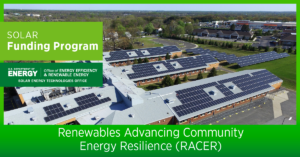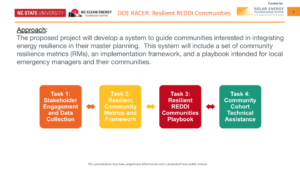Resilient Renewable Energy to Diminish Disaster Impacts on Communities Project Kicks Off
 Last year, the North Carolina Clean Energy Technology Center (NCCETC) at NC State University announced that it was selected to receive a $1 million award from the U.S. Department of Energy (DOE) Solar Energy Technologies Office (SETO) to enable communities to use solar and solar-plus-storage to enhance resilience and prevent disruptions in power caused by extreme weather and other events.
Last year, the North Carolina Clean Energy Technology Center (NCCETC) at NC State University announced that it was selected to receive a $1 million award from the U.S. Department of Energy (DOE) Solar Energy Technologies Office (SETO) to enable communities to use solar and solar-plus-storage to enhance resilience and prevent disruptions in power caused by extreme weather and other events.
In June 2023, Isaac Panzarella and Rebekah de la Mora represented NCCETC at a meeting hosted by the DOE to kickoff the 20 projects selected as part of the Renewables Advancing Community Energy Resilience (RACER) funding program. Isaac Panzerella, Associate Director of Technical Services at NCCETC, is serving as the Principal Investigator for this project.
The Resilient Renewable Energy to Diminish Disaster Impacts on Communities (Resilient REDDI Communities) project will develop a novel set of resiliency metrics and create a playbook to guide emergency managers and their communities to assess and implement enhanced energy resilience strategies to mitigate the effects of energy loss during a disaster. Development of the metrics and playbook will be accomplished through an exchange of ideas, data, and technical assistance delivery a number of North Carolina communities interested in enhancing community resilience with renewable energy.
“Creating a playbook will help local emergency managers plan and implement prioritized measures to strengthen resilience and ultimately improve their community’s ability to lessen the impact of power outages during and after after damaging events,” said Panzarella.
 The project team plans to work with a cohort of up to 12 diverse communities to develop and test a process for selecting facilities, assessing for economic feasibility, determining resilience benefits and developing the resilience resources. An important outcome will be the identification of ready-to-develop solar photovoltaic (PV) and energy storage projects that can benefit the cohort communities. Through the use of the new metrics, these projects will have additional justification based on their risk mitigation and impact reduction benefits.
The project team plans to work with a cohort of up to 12 diverse communities to develop and test a process for selecting facilities, assessing for economic feasibility, determining resilience benefits and developing the resilience resources. An important outcome will be the identification of ready-to-develop solar photovoltaic (PV) and energy storage projects that can benefit the cohort communities. Through the use of the new metrics, these projects will have additional justification based on their risk mitigation and impact reduction benefits.
“The aim is to enable local communities – through the leadership of their emergency management teams and other local organizations – to make informed decisions for deployment of resilient solar PV and energy storage projects where they will have the greatest impact on improving community resilience,” explained Rebekah de la Mora, Policy Analyst at NCCETC.
Emergency management agencies have responsibilities through four generally recognized phases: mitigation, preparedness, response and recovery. Energy assurance is only one of many key emergency support functions, and the availability of electricity during and after a disaster is a very important metric for community resilience. “The playbook we’re developing is going to include a framework for integrating enhanced community energy resilience in the planning and execution of each phase of emergency management,” de la Mora said.
 A primary focus of the Resilient REDDI Communities project will be the use of distributed energy resilience resources, such as solar-plus-storage, at several levels of local disaster response including critical infrastructure facilities, community outposts, and low-income housing.
A primary focus of the Resilient REDDI Communities project will be the use of distributed energy resilience resources, such as solar-plus-storage, at several levels of local disaster response including critical infrastructure facilities, community outposts, and low-income housing.
Distributed energy resources (DERs) are small-scale energy resources that are interconnected to the electric grid. DERs not only help to diversify a community’s generation mix to reduce the grid’s dependency on a single fuel type, but they can also provide key energy supply when larger generators go offline during severe weather or other incapacitating events.
The NCCETC team is led by Principal Investigator Isaac Panzarella, along with NC State University co-Principal investigators Rebekah de la Mora, Dr. Harrison Fell and Dr. Jordan Kern. The project team includes several important partners as listed below:
- The City of Asheville
- The City of Wilmington
- North Carolina State Energy Program within the NC Department of Environmental Quality
- NC A&T University in Greensboro, NC
- The Smart Electric Power Alliance (SEPA)
ABOUT THE N.C. CLEAN ENERGY TECHNOLOGY CENTER
The N.C. Clean Energy Technology Center, as part of the College of Engineering at North Carolina State University, advances a sustainable energy economy by educating, demonstrating and providing support for clean energy technologies, practices and policies. It serves as a resource for innovative, sustainable energy technologies through technology demonstration, technical assistance, outreach and training. For more information about the Center, visit: http://www.nccleantech.ncsu.edu. Twitter: @NCCleanTech
ABOUT THE SOLAR ENERGY TECHNOLOGIES OFFICE
The U.S. Department of Energy Solar Energy Technologies Office supports research and development across the solar energy spectrum to drive innovation, lower costs, and support an equitable transition to a decarbonized economy. Learn more at energy.gov/solar-office.